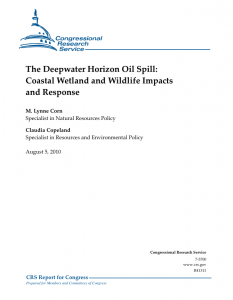Full Title: The Deepwater Horizon Oil Spill: Coastal Wetland and Wildlife Impacts and Response
Author(s): M. Lynne Corn and Claudia Copeland
Publisher(s): Congressional Research Service (CRS)
Publication Date: August 1, 2010
Full Text: Download Resource
Description (excerpt):
The explosion of the Deepwater Horizon drilling rig in the Gulf of Mexico on April 20, 2010, and the resulting oil spill began a cascade of effects on the coastal areas of the Gulf and on the wealth of species that inhabit those areas. These wetlands, like those elsewhere, have value for water quality, flood control, shoreline protection, and recreation. They serve as nurseries for many species, including fish and shellfish of commercial significance, waterfowl, and a host of resident and migratory species. They also have cultural importance to the people of the Gulf. The effects of the spill come on top of historic wetland losses due to subsidence, drainage, and saltwater intrusion, along with rising sea levels, coastal erosion, and global climate change.
Impacts of oil spills on wetland ecosystems depend on multiple factors, including the type of oil, exposure of the oil to weathering factors before it reaches the shore, the season in which the spill occurs, etc. Estimating wildlife impacts is particularly difficult in this case because the spill occurred far offshore, and the initial wildlife mortality came far out in the Gulf, where animals sank without reaching the shore. With the arrival of oil closer to the shore, more animals could be counted. Moreover, because the Gulf wetlands host many species of birds during seasonal migrations, impacts of the spill could be felt in areas well away from the Gulf. Mitigation and cleanup of damage to wetlands is far from an exact science and involves many tradeoffs: there is no single, best solution. This report describes a range of options from mechanical recovery and use of dispersants to doing nothing.
